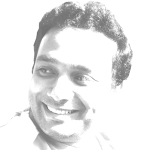Very recently I'd bought "Empires of Indus", by Alice Albinia - by far the best travelogue I've ever read. (I'll very soon write a blog on this book). At the same time my friend Pankaj gave me a huge bricked shaped book - Dan Brown's latest thriller - Lost Symbol. Pankaj did warn me of this 'brick' and advised me not to read this in public because I may get so violent that I may throw the book to people around me!! Well, Pankaj has a very good sense of humor and I didn't take it in literal sense. But I now know that he was not wrong!! Yes, I did go violent not because I didn't like the book, but because the writer has betrayed an avid reader of his and that's a serious offence for a writer.
Well, first of all there's no denying the fact that Dan Brown researched even better than any of his previous books. I always maintain that his "Deception Point" is by far his most researched book. In fact I can say that "Deception Point" may be one of the most scientifically researched books I've read. "Lost Symbol" seems to be even more deeply researched. Most importantly he has endeavored very well to mix the spirituality and mysticism of all the ancient religions and cultures with modern science. In general Indian spirituality is more often than not depicted in a derogatory manner by most of the Western writers, off course barring the better few. After the likes of Einstein and Heisenberg, Indian spirituality and mysticism and philosophies never needed any other Western writer of novelist for propaganda or generous space in books. Nevertheless, Dan Brown's indepth and authentic studies about the advancements of scientific knowledge in ancient India and its correct depiction is indeed a very surprising experience in reading this book. I haven't seen much books, even now when information and knowledge is no longer restricted or limited, talking about advanced Indian sciences of ancient times at par with that of the Greeks and Egyptians. More over the entire usage of Noetic Science is a very charming thing. In today's worlds when traditions and cultures seem to attract lesser and lesser people, it's indeed a very good attempt to instill in the young minds the thought that science and technologies never tell anyone to be dismissive of religion, faith or cultures. It's true that most of the dialogues that Katherine Solomon, the Noetic scientist and a main character of the novel, speaks have shades of Einstein, still it's indeed a good attempt to bring it up again for the young readers - who I doubt would ever read anything written by Einstein - be it scientific or else.
But the main problem with "Lost Symbol" is that it's too repetitive and boring. First of all it's probably bigger in size than the previous adventures of Robert Langdon - it's more than 500 pages and just imagine those many pages in a hard bound edition. The stuff like ancient mysteries and hidden knowledge and the excessive of the weirdly depicted dark rituals of the Freemasons have been dealt with quite heavily in the past two adventures. One more novel again on the same topic and going into so much depth about the same things seemed quite boring to me. I was shocked to find that I'd to skip pages of grotesque descriptions of rituals that the villain Ma'lakh indulge in. It may be true and very authentic but I somehow didn't enjoy. I was feeling bad because I never had to skip even a single word of the other works of Dan Brown. The dialogues between the different characters get too lengthy and hence boring. At times the novel seems to be mere research notes rather than a thriller. And at least once, I can remember very well, that the research notes are over done. Just think about this - Katherine Solomon is shown to have invented a gadget that measures the weight of the soul!! It's a very simple stuff - a dying person is put into this "soul-measuring" gadget and Katherine keeps a tab on the weight of the person. As soon as the person dies his weight is shown to reduce by a notable amount - accounting for the soul that leaves the body of the dead person!! Wow, that should impress us Indians who believe that atma or Ruh never dies but leave a body to enter into another!!
The story is quite simple. The Solomons, a family of highly esteemed masons have been hiding for more than a century a clue that will lead to some ancient mysteries and the most enlightening knowledge of the world which is supposed to be hidden somewhere in Washington DC. Obviously Robert Langdon is summoned to decipher it. The bachelor Robert has, this time, as his charming companion Ms. Katherine Solomon, the sister of Peter Solomon - the third generation Solomon keeping the clue in secrecy. Off course there's the villain Ma'lakh, who reminds us of the villain of "Da Vinci Code" - a weird nut who indulges in dark rituals!! And there is the CIA and a very unconvincing national threat. I may not speak more about this because avid readers may get angry because I'm spilling to much. But I can say that at present an American would be surely considering many things else as national threats rather than what is told in the novel. A previous American president was allegedly given a blow job by an intern and when that was spilled out even then it didn't become a national threat and here Dan Brown thinks that if people know that some senators indulge in dark rituals then that's a national threat!! Wow..... is it?
C'mon, Americans, what do you say?








No comments:
Post a Comment